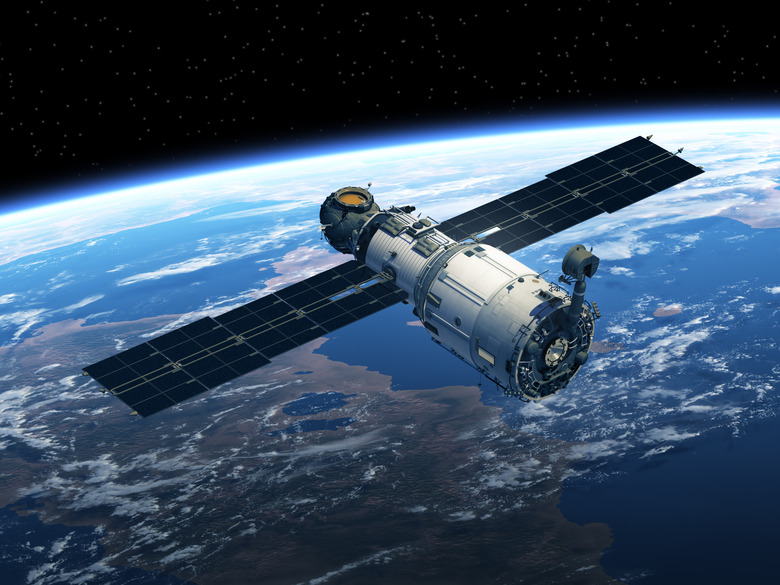Why Are Private Companies In Space?
The dream of commercial spaceflights may come true as soon as 2018. The world changed for a few budding and well-financed space explorers when Congress enacted the Commercial Space Launch Amendment Act in 2004, making private space exploration legal. NASA wrote in its "Public-Private Partnerships for Space Capability Development" plan that it now has a mandate to partner with industry "to advance the commercial space sector." Some companies already ferry cargo to the International Space Station, install satellites into space and have plans on the drawing table to commercially mine asteroids for their precious metals and resources. With the privatization of space, exploration of the cosmos might just change the world.
Companies Who Plan Space Exploration
Companies Who Plan Space Exploration
Some of the companies in space or with plans for space exploration include:
- SpaceX
- Rocket Lab
- Orbital ATK
- Blue Origin
- Sierra Nevada Corporation
- Virgin Galactic
Multiple companies have active space plans – some are already there – to either go into space themselves or partner with NASA for new space crafts and satellites. Elon Musk's SpaceX company leads the pack with several successful launches and a plan to colonize Mars. Rocket Lab successfully reached orbit and deployed its payload in January 2018, Orbital ATK sent up another government satellite in February 2018, and the Sierra Nevada Corporation recently received clearance for a 2020 launch of its Dream Chaser spacecraft.
Jeff Bezos' Blue Origin company just completed a successful orbit of its new crew capsule with a mannequin inside in December 2017. With several successful test flights under its belt, Sir Richard Branson's Virgin Galactic cites immediate plans to work with Italy and Saudi Arabia in space exploration.
Pros and Cons of Private Space Enterprises
Pros and Cons of Private Space
Enterprises
The biggest benefit to privatizing space starts with its cost-effectiveness. Commercial launches significantly affect the cost for NASA to send satellites into space by dropping the per-launch cost from $4 billion to less than $50 million, allowing NASA to use its money elsewhere. Privatization also spurs innovation when companies compete to come up with new technologies. The drawbacks include promises by private companies that result in failure. Not everything designed for space works, and many private-company rockets blow up after launch or while on the pad. Profit, not research, drives a private company's bottom line, leaving several space exploration projects on the table forever that might benefit humankind.
The Tesla in Space
The Tesla in Space
In February 2018, Elon Musk launched a Tesla car into space complete with a "Starman" strapped into the driver's seat and a camera that recorded the launch and that continues to record while in orbit. The point behind the launch was to test the Falcon Heavy rockets, the most powerful rockets launched from Earth to date, save for the Saturn V moon rocket with the largest payload last launched in 1973. This rocket system can lift close to 64 metric tons into space. A 737-jetliner loaded with fuel, crew, passengers and their luggage weighs less. Two of the rockets successfully set down back on Earth after the launch.
Space Travel for Those Who Can Afford It
Space Travel for Those Who Can Afford It
Virgin Galactic plans to begin commercial spaceflights sometime in 2018 using a space plane, according to news releases by the company. The company continues its test flights in the Mojave Desert, but it plans to base its commercial flights into space from New Mexico's Spaceport America. The spaceport, finished five years ago, partnered with the U.S. Army White Sands Missile Range and is a member of the Commercial Spaceflight Federation.
The 18,000-acre site sits at 4,600 feet above sea level in the high desert. The location offers an ideal shot into space with more than 340 days of sunshine and 6,000 square miles of open and protected air space. But unless you win the lottery, don't expect to go into space anytime soon, because Virgin Galactic tickets start at $250,000 and require the full amount up-front as a deposit.
References
- FAA: Commercial Space Launch Amendments Act of 2004
- NASA: NASA Partnership Report
- Rocket Lab USA: Updates
- Blue Origin: News
- Virgin Galactic: News
- Spaceport America: About Us
- CNN: What Does a $250,000 Ticket to Space With Virgin Galactic Actually Buy You?
- Space News: Sierra Nevada Gets NASA Approval for First Dream Chaser ISS Cargo Mission
Cite This Article
MLA
Brenner, Laurie. "Why Are Private Companies In Space?" sciencing.com, https://www.sciencing.com/why-are-private-companies-in-space-13710338/. 20 March 2018.
APA
Brenner, Laurie. (2018, March 20). Why Are Private Companies In Space?. sciencing.com. Retrieved from https://www.sciencing.com/why-are-private-companies-in-space-13710338/
Chicago
Brenner, Laurie. Why Are Private Companies In Space? last modified August 30, 2022. https://www.sciencing.com/why-are-private-companies-in-space-13710338/
